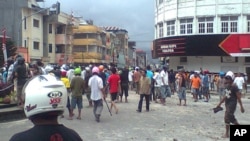Hundreds of police have brought calm to Indonesia’s eastern Maluku province following Sunday's violent Muslim-Christian clashes that left three dead and more than 80 injured. The incident, apparently sparked by a simple traffic accident, called attention to a region still recovering from years of sectarian conflict.
More than 400 police have helped quell riots that broke out Sunday on the eastern island of Maluku, following the death of a Muslim motorcycle taxi driver.
Police say the man died in a traffic accident, but rumors sent via mobile phone message claimed he was tortured and killed by a group of Christians.
The rumors set off physical clashes in the provincial capital Ambon, where gangs of Muslims and Christians threw rocks and swung machetes.
President Susilo Bambang Yudhoyono, often criticized for being slow to react to recent incidents of sectarian conflict, immediately ordered hundreds of security troops to the area.
Police said Ambon was calm by Monday, but the sudden riot stirred fears that violence could return to a city still struggling to overcome years of sectarian tension.
International Crisis Group senior analyst Sidney Jones says unresolved grievances and lingering memories helped fan the flames.
“The lasting impact of the conflict is mutual distrust, so that when some issue arises, as it did in this case, that the emotions that are raised as a result can very quickly explode into something major,” said Jones.
From 1999 to 2002 Ambon witnessed a communal conflict that killed more than 5,000 people and displaced hundreds of thousands.
A government-mediated peace pact between Christian and Muslim groups brought an end to the violence in February 2002. But some scholars say unemployment and slow economic growth following the reconciliation have prevented old wounds from fully healing.
Jones also notes that communities that were once mixed before the conflict are now very specifically divided according to religion, and that creates the conditions for further distrust and misunderstanding.
Human-rights activists say the media has exaggerated the issue and have called for the police and military to not aggravate the situation.
Jones says the government has learned from the past, but she also notes that current tensions require measures beyond a security response.
“Communications also plays a major role both causing and in solving the problem," she said. "When messages get sent by short text message on mobile phone the way they did this time around, the government needs to be prepared instantly to quash rumors by also sending out sms’s [text messages] on a massive scale.”
Indonesia is predominantly Muslim, but large Christian communities live in Maluku and elsewhere.
In August a Jakarta court handed down relatively light, six-month sentences to the leaders of a brutal mob attack that killed three members of a minority Muslim sect, the Ahmadiya. The verdict drew condemnation from the international community, but sparked little reaction from religious leaders and government officials.
Jones says that in places where there is a history of violence, however, there is a will to ensure it does not happen again. Police say they are currently investigating the person responsible for spreading the text messages and local officials are working with community and religious leaders to maintain calm.
Indonesia Government Tries to Defuse Muslim-Christian Clashes




